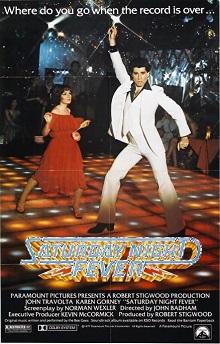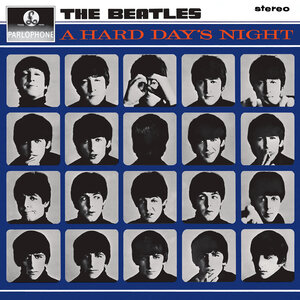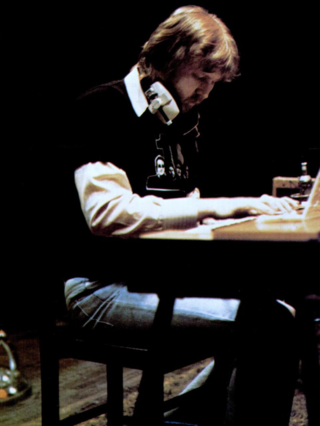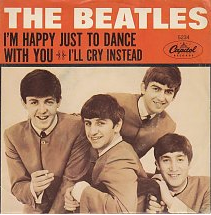When the Night may refer to:
- When the Night (film), a 2011 Italian drama film
- When the Night (album), a 2013 album by St. Lucia
When the Night may refer to:

Saturday Night Fever is a 1977 American dance drama film directed by John Badham and produced by Robert Stigwood. It stars John Travolta as Tony Manero, a young Italian-American man who spends his weekends dancing and drinking at a local discothèque while dealing with social tensions and disillusionment in his working class ethnic neighborhood in Brooklyn. The story is based on "Tribal Rites of the New Saturday Night", a mostly fictional 1976 article by music writer Nik Cohn.

A Hard Day's Night is the third studio album by the English rock band the Beatles, released on 10 July 1964 by Parlophone, with side one containing songs from the soundtrack to their film of the same name. The American version of the album was released two weeks earlier, on 26 June 1964 by United Artists Records, with a different track listing that included selections from George Martin's film score. In contrast to the Beatles' first two albums, all 13 tracks on A Hard Day's Night were written by John Lennon and Paul McCartney, showcasing the development of their songwriting partnership.

Stephen Glenn Martin is an American comedian, actor, writer, producer, and musician. Known for his work in comedy films, television, and recording, he has received many accolades, including five Grammy Awards, a Primetime Emmy Award and an Honorary Academy Award, in addition to nominations for two Tony Awards. He also received the Mark Twain Prize for American Humor in 2005, the Kennedy Center Honors in 2007, and an AFI Life Achievement Award in 2015. In 2004, Comedy Central ranked Martin at sixth place in a list of the 100 greatest stand-up comics. The Guardian named him one of the best actors never to have received an Academy Award nomination.

Harry Edward Nilsson III, sometimes credited as Nilsson, was an American singer-songwriter who reached the peak of his success in the early 1970s. His work is characterized by pioneering vocal overdub experiments, a return to the Great American Songbook, and fusions of Caribbean sounds. Nilsson was one of the few major pop-rock recording artists to achieve significant commercial success without performing major public concerts or touring regularly.

Saturday Night Fever is the soundtrack album from the 1977 film Saturday Night Fever starring John Travolta. The soundtrack was released on November 15, 1977 by RSO Records. Prior to the release of Thriller by Michael Jackson, Saturday Night Fever was the best-selling album in music history, and still ranks among the best-selling soundtrack albums worldwide, with sales figures of over 40 million copies.
A night shift is either a group of workers night working, or the period in which they work.

"I'm Happy Just to Dance with You" is a song written by John Lennon and Paul McCartney and recorded in 1964 by the English rock band the Beatles for the film soundtrack to A Hard Day's Night. Lead vocals are by George Harrison, whose performance in the film marked the first mass media depiction of Harrison singing lead.
A nighthawk is a nocturnal bird.
A Hard Day's Night may refer to:
Alcohol may refer to:
Silvía Night is a fictional, satirical character on Sjáumst með Silvíu Nótt, an Icelandic comedy show of the television channel Skjár einn. The character was invented by Gaukur Úlfarsson and Ágústa Eva Erlendsdóttir; the latter plays Silvía Night. Silvía Night interviews people in real-life situations.

"The Way You Look To-night" is a song from the film Swing Time that was performed by Fred Astaire and composed by Jerome Kern with lyrics written by Dorothy Fields. It won the Academy Award for Best Original Song in 1936. Fields remarked, "The first time Jerry played that melody for me I went out and started to cry. The release absolutely killed me. I couldn't stop, it was so beautiful."

Joseph Sumner is an English singer-songwriter and bassist for the rock band Fiction Plane, and co-founder of the company Vyclone, which made an app for recording video from multiple angles.
Friday Night Lights may refer to:
Night is the period in which the sun is below the horizon.
Witching hour is a time of night associated with supernatural events.
Into the Night may refer to:
Midnight sun is a natural phenomenon that occurs when the Sun remains visible at the local midnight.
The Night may refer to:

Finneas Baird O'Connell, also known mononymously as Finneas, is an American singer-songwriter, record producer, and actor. The recipient of numerous accolades, he has written and produced music for various artists, most notably his younger sister, Billie Eilish. He has won 10 Grammy Awards among 18 total nominations, including nominations for the Big Four categories. He has made history as the youngest act to win the Producer of the Year, Non-Classical category. For his work with Eilish, he has won Record of the Year twice in a row, Album of the Year, Song of the Year, Best Pop Vocal Album, and Best Engineered Album, Non-Classical. He was also nominated for Best New Artist for his solo work. Their song "No Time to Die" from the film of the same name earned him an Academy Award, a Golden Globe and another Grammy. Two years later, for their song "What Was I Made For?", they won the Grammy Award for Song of the Year, along with the Academy Award for Best Original Song and the Golden Globe for Best Original Song. They became the youngest 2-time Academy Awards winners ever. He had also worked with high-profile artists such as Drake, Kid Cudi, Nicki Minaj, Selena Gomez, Camila Cabello, Demi Lovato, Halsey, Justin Bieber, Karol G, Girl in Red, Rosalía, Tove Lo and Tate McRae.